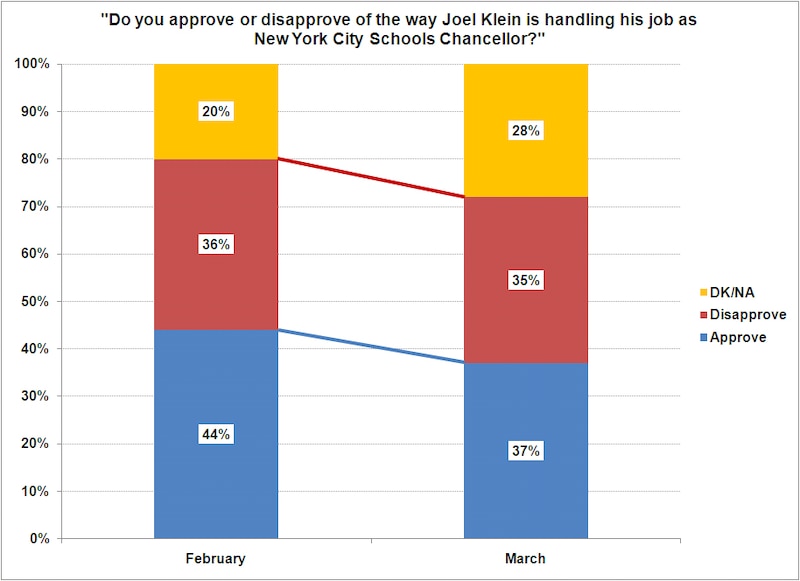One of the charming features of GothamSchools is that, as a blogger, I can bite the hand that feeds me. Philissa Cramer and Elizabeth Green, the two journalists who make this site a must-read for me and thousands of others daily, have been very gracious in letting me post here. So I hope they will take the occasional riff on their work in the spirit in which I intend it: as a gentle, and educational, rebuke.
Yesterday, Philissa posted a story on a new poll out of Quinnipiac University on all things New York City, including mayoral control of the schools and Joel Klein’s performance as Chancellor of the NYC schools. The post was entitled “Sinking approval for mayor’s school efforts, chancellor,” and was accompanied by a chart that showed the percentage of New Yorkers who approve of Joel Klein’s handling of the schools at six time points between October, 2008 and March, 2009. Klein’s approval rating ranged from 42% to 44% between October and February, 2009, and the new poll reported that 37% approved of Klein’s efforts.
The figure, unfortunately, distorted the trend. Rather than using a true zero point, the scale of the chart ranged from 36%, at the low end, to 45%, at the upper end. The decline from 44% in February, 2009 to 37% in March, 2009 took up most of the chart, and made it seem much sharper than it would have if the scale for the chart were 0% to 100%.
Moreover, as is true for any poll, the percentages are sample estimates for which there is a margin of error. The sample size for the March, 2009 poll was 1,142 registered New York City voters; the sample size of 984 for the February, 2009 poll was a bit smaller. The precision of these percentages is a function of the sample size, and samples of this size yield a “margin of error” of about 3% — which means that the March approval percentage for the population of registered New York City voters from which the sample was drawn could plausibly range anywhere from 34% to 40%.
The figure below shows the percentages for February and March. Respondents could approve, disapprove, or report that they don’t know or gave no answer (DK/NA). Given the uncertainty around these percentages, we can’t rule out the possibility that the percentage of NYC voters who approve of Joel Klein’s handling of his job as Chancellor of the NYC schools has remained constant from February to March of this year. And the percentage of voters who disapprove of Klein’s performance clearly didn’t change. The one change we can believe in-to coin a phrase-is that the percentage of voters who don’t know about Klein’s performance has increased from 20% to 28%, a statistically significant change.

My interpretation is that the increased scrutiny of mayoral control may, over time, result in shifts in public perception regarding mayoral control and Chancellor Klein’s performance, but it’s too soon to tell. In the short run, the battle for public opinion may simply make more people unsure about what to believe.
About our First Person series:
First Person is where Chalkbeat features personal essays by educators, students, parents, and others trying to improve public education. Read our submission guidelines here.
